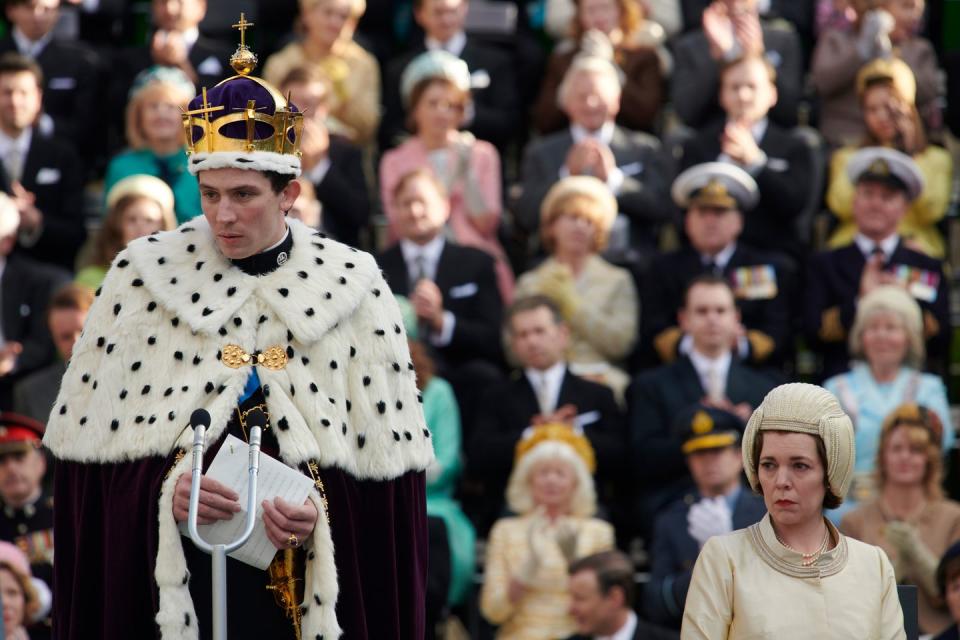Read the Full Text of Prince Charles's Real Investiture Speech
Episode five of The Crown's third season focuses on Prince Charles (Josh O'Connor) in the lead-up to his investiture as the Prince of Wales in 1969. In a bid to smooth over relations between England and Wales, prime minister Harold Wilson suggests that Charles should spend some time in the country and learn the Welsh language, to which Queen Elizabeth reluctantly agrees.
We're once again given reason to feel extremely sad for the now 20-year-old Charles, as he's yanked away from his studies at the University of Cambridge—where he finally seems happy and settled after many years of troubled schooling—and sent away to Aberystwyth, Wales. Though he's greeted by protestors and treated with hostility by his fellow students, Charles eventually forms a bond with his tutor Edward Millward (Mark Lewis Jones), and becomes sympathetic to the idea that Wales should be more independent from the United Kingdom. That sentiment colors his investiture speech, in which he argues for Wales to maintain its own national identity.

"It was a great honor to be welcomed to Wales and to have my eyes opened to the Welsh perspective," Charles says in the show. "Wales has a history to be proud of, and it is completely understandable that the Welsh wish to hold on to their heritage, their native culture, their identity, their disposition and their personality as a nation. It is important we respect that. Wales has her own identity, her own character, her own will. Her own voice." The queen is less than thrilled with Charles's speech, and berates him for breaking royal protocol by taking a political stance.
In real life, Charles's speech didn't play out exactly like it was shown in The Crown, but it did create some significant waves, and led to fears that Charles had been influenced by Welsh nationalists during his time in Aberystwyth. You can read the full transcript of Charles's investiture speech below. The first two paragraphs were spoken in Welsh, after which he switched to English.
The words of your address have certainly touched me deeply and I can assure you I have taken note of the hopes expressed in them. It is, indeed, my firm intention to associate myself in word and deed with as much of the life of the Principality as possible—and what a Principality!
It is with a certain sense of pride and emotion that I have received these symbols of office, here in this magnificent fortress, where no-one could fail to be stirred by its atmosphere of time-worn grandeur, nor where I myself could be unaware of the long history of Wales in its determination to remain individual and to guard its own particular heritage. A heritage that dates back into the mists of ancient British history, that has produced many brave men, Princes, poets, bards, scholars and more recently, great singers, a very memorable "goon" and eminent film stars. All these people have been inspired in some way by this heritage.
I hope and trust that in time I shall be able to offer my own contribution and to do that I seek your cooperation and understanding. Speaking for myself, as a result of my two-month stay in this country, I have come to see far more in the title I hold than hitherto. I am more than grateful to the people of this Principality for making my brief stay so immensely worthwhile and for giving me such encouragement in the learning of the language.
I know that social conditions have changed since 50 years ago and, of course, are still changing. The demands on a Prince of Wales have altered, but I am determined to serve and to try as best I can to live up to those demands, whatever they might be in the rather uncertain future. One thing I am clear about and it is that Wales needs to look forward without forsaking the traditions and essential aspects of her past. The past can be just as much a stimulus to the future as anything else. By the affirmation of your loyalty today for which I express my gratitude, this will not simply be a faint hope.
You Might Also Like

